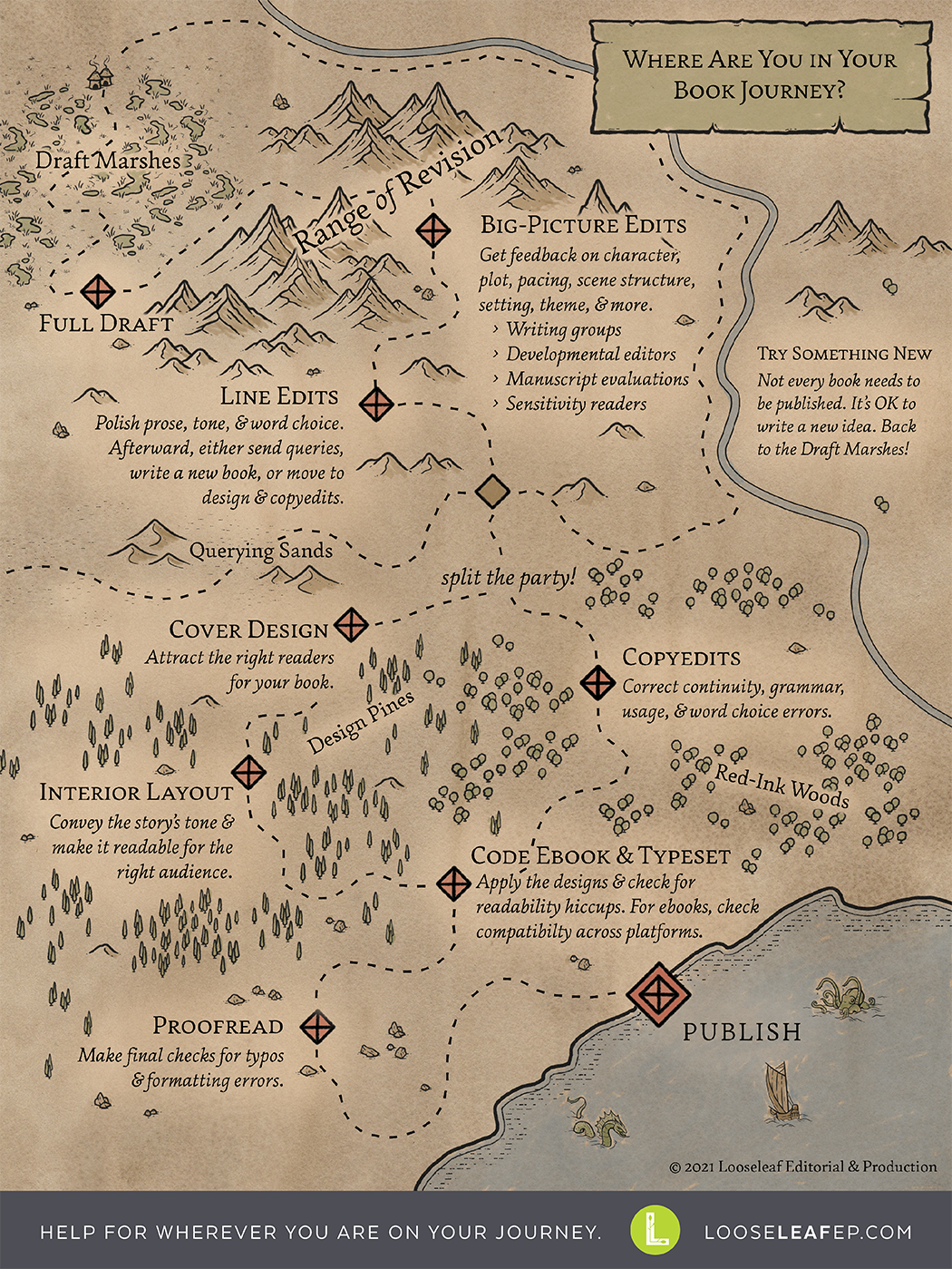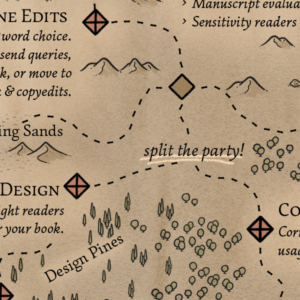 If you picked the self-publishing fork in the road after the Line Edit Foothills, it’s time to split your book journey party. You’ve got multiple quest objectives, and you can accomplish some of them at the same time if you plan it right. Right now you need to do two things: polish your manuscript and put together the graphic design pieces that make your book visually delightful. [Read more…] about Split Your Book Journey Party
If you picked the self-publishing fork in the road after the Line Edit Foothills, it’s time to split your book journey party. You’ve got multiple quest objectives, and you can accomplish some of them at the same time if you plan it right. Right now you need to do two things: polish your manuscript and put together the graphic design pieces that make your book visually delightful. [Read more…] about Split Your Book Journey Party
The Line Edit Foothills
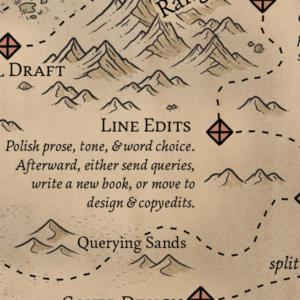 On your book journey, you exit the Range of Revision and ease into the Line Edit Foothills. After conquering the larger mountains of character and plot, now it’s time to cross the rolling hills of cadence and prose. When the sun hits them just right, these hills sing.[1]Emperor’s New Groove reference 100 percent intended. [Read more…] about The Line Edit Foothills
On your book journey, you exit the Range of Revision and ease into the Line Edit Foothills. After conquering the larger mountains of character and plot, now it’s time to cross the rolling hills of cadence and prose. When the sun hits them just right, these hills sing.[1]Emperor’s New Groove reference 100 percent intended. [Read more…] about The Line Edit Foothills
References
| ↑1 | Emperor’s New Groove reference 100 percent intended. |
|---|
The Range of Revision
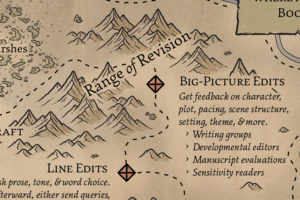 Revising a manuscript is a journey through rough terrain. There are so many mountains to climb—character, plot, pacing, setting—and so many different ways to get through it all. That’s why the Range of Revision covers a big chunk of Looseleaf’s Book Journey Map. [Read more…] about The Range of Revision
Revising a manuscript is a journey through rough terrain. There are so many mountains to climb—character, plot, pacing, setting—and so many different ways to get through it all. That’s why the Range of Revision covers a big chunk of Looseleaf’s Book Journey Map. [Read more…] about The Range of Revision
The Draft Marshes
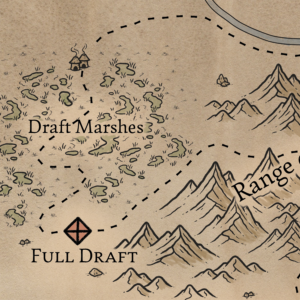 Drafting a novel is no easy task. A full draft, no matter how messy, is a huge accomplishment. That’s why Full Draft is the first destination on Looseleaf’s Book Journey Map … and why you have to go through the Draft Marshes to get there. [Read more…] about The Draft Marshes
Drafting a novel is no easy task. A full draft, no matter how messy, is a huge accomplishment. That’s why Full Draft is the first destination on Looseleaf’s Book Journey Map … and why you have to go through the Draft Marshes to get there. [Read more…] about The Draft Marshes
Where Are You in Your Book Journey?
Especially if you’re new to the book-writing process, all the different types of editing and the steps for publication can be confusing. Now there’s a map for that! This map covers the main steps and phases for writing and self-publishing a book. (It also lets you know when to turn off to go the traditional publishing route via querying agents and publishers.) Once you know where you are in your process, it’s easier to get the help you need, whether from a writing group and critique partners or from professional editors and designers.
Add Evocative Sensory Details to Your Scenes
Last week Looseleaf’s Kristy S. Gilbert was an editing special guest at the Life, the Universe, and Everything Symposium, and we’re going to post a few snippets from her panels. Today’s bit is from the panel “I Sense Something: Adding the Senses.” Excerpts are lightly edited for clarity (and some parts are summarized).
Stephen Gashler: Some sensory details we can readily identify with, like the color of a sunset—the pinks and the oranges—or maybe the barking dog in the distances. Some things are harder to describe, specifically the tasting and the smelling and feeling sensations. Given that some of these are overlooked what are some tips you have for describing some of these harder-to-describe sensations?
Michaelbrent Collings pulled out some tough love, pointing out that just because it’s hard doesn’t mean it isn’t important to your writing or worth the effort to learn. He also noted that you can use other sensory descriptions. Saying “the orange tasted bright and clean” uses some visual descriptions, but it describes flavor.
Kristy S. Gilbert: Along those lines, I also think—it’s not necessarily that you have to get the other person to know exactly what you’re talking about. Like when you say something is the pink of a sunset, it’s not so they know exactly what pink it is: it’s so you get the emotional note of a sunset into your scene. So I can say I went outside and the air smelled of dying worms—and that is the smell after a massive rainstorm, and all the worms come out, and they’re all dying, but I don’t need to spend a bunch of time being like, “Yeah, it’s that weird metallic smell/taste/thing you get after a long rainstorm.” I just have someone walk out, and the world is sopping wet and smells like dying worms. [Read more…] about Add Evocative Sensory Details to Your Scenes
When Am I Ready for a Developmental Edit?
Last week Looseleaf’s Kristy S. Gilbert was an editing special guest at the Life, the Universe, and Everything Symposium, and we’re going to post a few snippets from her panels. Today’s bit is from the panel “Developmental Editors.” Excerpts are lightly edited for clarity (and some parts are summarized).
Brittany Passmore: A lot of writers get really excited when they finish their book, and sometimes they’re just not sure if they’re ready for that or if they need to go through some other editing process first, so how would people know they’re ready for developmental editing, if it’s too soon, or maybe they should have done it sooner . . . what do you guys think?
Amy Michelle Carpenter, Emma Heggem, and Nic Nelson shared some wonderful advice, including working with writing groups and beta readers so you can get more bang for your buck (and so you can have a hivemind help you brainstorm fixes for the biggest revisions) and remembering that many developmental editors are happy to look over your outline and give feedback there even before you draft the book.
Kristy S. Gilbert: Yeah, I think especially in nonfiction, developmental editing can mean something different. Developmental editing can mean looking at an outline and giving feedback on how to develop the actual book that will eventually come of it. And it can also, on the other side, mean taking a full book and developing it further, so it is important to know what you’re getting when you sign up for developmental editing just ‘cause there is that fuzziness in terminology use. [Read more…] about When Am I Ready for a Developmental Edit?
LTUE Special Guest Schedule
This year I’m an editing special guest at the Life, the Universe, and Everything Symposium. LTUE is an annual creator conference for science fiction and fantasy, and this year it’s all virtual, so you don’t have to be local (or travel to) Utah County to attend! Because I’m a special guest, I’m on an unusually large number of panels, some for my expertise in folklore and some for my experience as an editor and book designer. If you’re tuning in to LTUE (register at LTUE.net), stop by a panel or two!
LTUE is a relatively inexpensive conference that can introduce you to a wide range of topics, author perspectives, and community resources.
Thursday
Coffee, Tea, Me: The Culture of Drinking Coffee and Tea (4:00 PM)
Coffee and tea are common drinks throughout the world. Many places have ceremonies, rituals, and traditions, both formal and informal, that revolve around these drinks. What are these traditions, and how do they vary in different times and places around the world? (Other panelists: Guest of Honor Alaya Dawn Johnson, Christine Tyler, and Newell Wright)
Copyediting for Immersive Worldbuilding (7:00 PM)
You’ve built a world for your story, but have you thought about how to present that world’s elements on the page? Not all dragons must be Dragons, and imaginary worlds feel more real with internal consistency. Learn how to use capitalization, italics, and linguistic consistency to help immerse readers in your world the way your characters experience it. Then learn how to communicate your choices to any editors you work with on your book, whether you’re self-publishing or using a traditional publisher. (This is a presentation, not a panel, so it’s just me talking, and I’ll do a Q&A at the end.)
